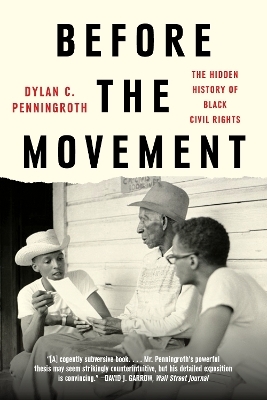
Before the Movement
The Hidden History of Black Civil Rights
Seiten
2024
WW Norton & Co (Verlag)
978-1-324-09564-4 (ISBN)
WW Norton & Co (Verlag)
978-1-324-09564-4 (ISBN)
- Noch nicht erschienen
- Portofrei ab CHF 40
- Auch auf Rechnung
- Artikel merken
The familiar story of civil rights goes like this: once, America’s legal system shut Black people out and refused to recognize their rights, their basic human dignity, or even their very lives. When lynch mobs gathered, police and judges often closed their eyes, if they didn’t join in. For Black people, law was a hostile, fearsome power to be avoided whenever possible. Then, starting in the 1940s, a few brave lawyers ventured south, bent on changing the law. Soon, ordinary African Americans, awakened by Supreme Court victories and galvanized by racial justice activists, launched the civil rights movement.
In Before the Movement, acclaimed historian Dylan C. Penningroth brilliantly revises the conventional story. Drawing on long-forgotten sources found in the basements of county courthouses across the nation, Penningroth reveals that African Americans, far from being ignorant about law until the middle of the twentieth century, have thought about, talked about, and used it going as far back as even the era of slavery. They dealt constantly with the laws of property, contract, inheritance, marriage and divorce, of associations (like churches and businesses and activist groups), and more. By exercising these “rights of everyday use,” Penningroth demonstrates, they made Black rights seem unremarkable. And in innumerable subtle ways, they helped shape the law itself—the laws all of us live under today.
Penningroth’s narrative, which stretches from the last decades of slavery to the 1970s, partly traces the history of his own family. Challenging accepted understandings of Black history framed by relations with white people, he puts Black people at the center of the story—their loves and anger and loneliness, their efforts to stay afloat, their mistakes and embarrassments, their fights, their ideas, their hopes and disappointments, in all their messy humanness. Before the Movement is an account of Black legal lives that looks beyond the Constitution and the criminal justice system to recover a rich, broader vision of Black life—a vision allied with, yet distinct from, “the freedom struggle.”
In Before the Movement, acclaimed historian Dylan C. Penningroth brilliantly revises the conventional story. Drawing on long-forgotten sources found in the basements of county courthouses across the nation, Penningroth reveals that African Americans, far from being ignorant about law until the middle of the twentieth century, have thought about, talked about, and used it going as far back as even the era of slavery. They dealt constantly with the laws of property, contract, inheritance, marriage and divorce, of associations (like churches and businesses and activist groups), and more. By exercising these “rights of everyday use,” Penningroth demonstrates, they made Black rights seem unremarkable. And in innumerable subtle ways, they helped shape the law itself—the laws all of us live under today.
Penningroth’s narrative, which stretches from the last decades of slavery to the 1970s, partly traces the history of his own family. Challenging accepted understandings of Black history framed by relations with white people, he puts Black people at the center of the story—their loves and anger and loneliness, their efforts to stay afloat, their mistakes and embarrassments, their fights, their ideas, their hopes and disappointments, in all their messy humanness. Before the Movement is an account of Black legal lives that looks beyond the Constitution and the criminal justice system to recover a rich, broader vision of Black life—a vision allied with, yet distinct from, “the freedom struggle.”
Dylan C. Penningroth is a professor of law and history at the University of California, Berkeley. A MacArthur Prize fellow and author of The Claims of Kinfolk: African American Property and Community in the Nineteenth-Century South, he lives in Kensington, California.
| Erscheinungsdatum | 08.10.2024 |
|---|---|
| Zusatzinfo | 42 illustrations |
| Verlagsort | New York |
| Sprache | englisch |
| Maße | 140 x 211 mm |
| Gewicht | 384 g |
| Themenwelt | Geisteswissenschaften ► Geschichte ► Regional- / Ländergeschichte |
| Geschichte ► Teilgebiete der Geschichte ► Kulturgeschichte | |
| Sozialwissenschaften ► Ethnologie | |
| Sozialwissenschaften ► Soziologie | |
| ISBN-10 | 1-324-09564-4 / 1324095644 |
| ISBN-13 | 978-1-324-09564-4 / 9781324095644 |
| Zustand | Neuware |
| Haben Sie eine Frage zum Produkt? |
Mehr entdecken
aus dem Bereich
aus dem Bereich
der stille Abschied vom bäuerlichen Leben in Deutschland
Buch | Hardcover (2023)
C.H.Beck (Verlag)
CHF 32,15
vom Mittelalter bis zur Gegenwart
Buch | Softcover (2024)
C.H.Beck (Verlag)
CHF 16,80


